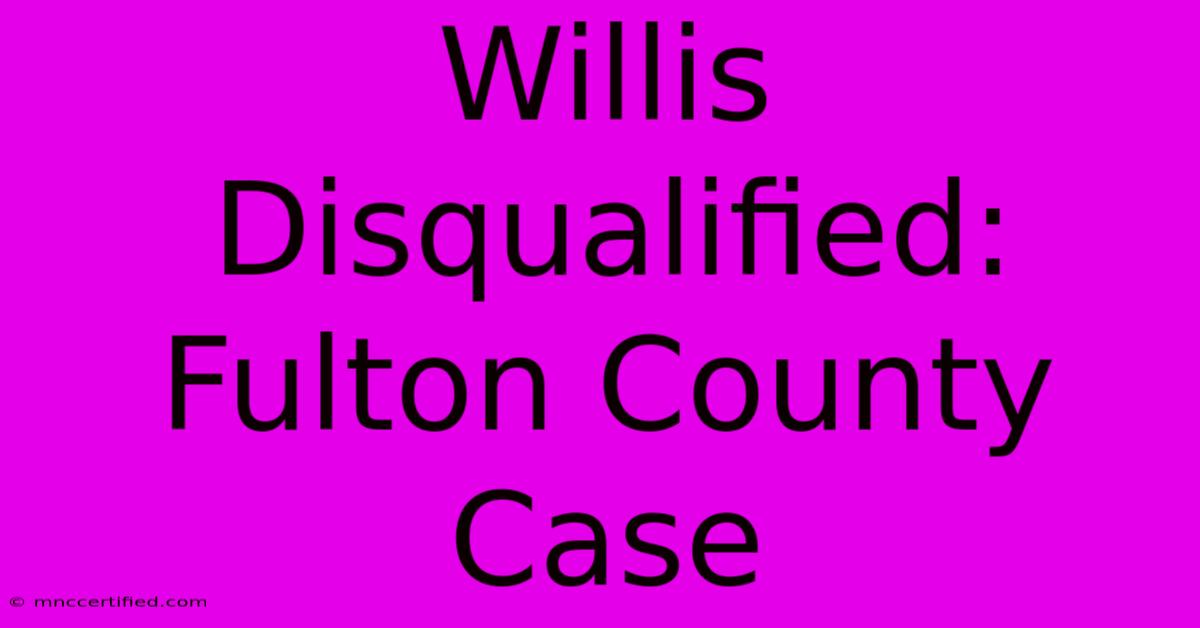Willis Disqualified: Fulton County Case

Table of Contents
Willis Disqualified: Unpacking the Fulton County Case and its Implications
The disqualification of former Atlanta Police Chief Erika Shields in the Fulton County, Georgia, case involving the prosecution of Donald Trump and his associates has sent ripples through the legal community. This decision, and the reasoning behind it, demands a closer look. This article will delve into the specifics of the disqualification, exploring the reasons cited by the judge, its potential impact on the case, and the broader implications for future legal proceedings.
Understanding the Fulton County Case
Before examining the disqualification, it's crucial to understand the context of the Fulton County case itself. This high-profile case involves charges against Donald Trump and 18 co-defendants, alleging attempts to interfere with the 2020 presidential election in Georgia. The case is complex, involving multiple defendants, numerous charges, and a significant amount of evidence. The sheer scale of the case makes any procedural challenges, such as the disqualification of a witness, potentially impactful.
Why Was Erika Shields Disqualified?
The disqualification of Erika Shields stems from concerns about potential bias and conflict of interest. While the specific details might vary depending on the court's official documentation, the general understanding points towards a potential conflict related to her prior role as Atlanta Police Chief and the events surrounding the 2020 election. It's crucial to understand that judges prioritize impartiality in legal proceedings. Any perceived or actual bias can lead to a motion for disqualification, and in this instance, the judge deemed the conflict significant enough to warrant removing her from participation. Further investigation into the court documents is necessary to understand the exact nature of this conflict and the judge's reasoning.
The Importance of Impartiality in Legal Proceedings
The principle of impartiality is a cornerstone of the American legal system. Judges and witnesses are expected to remain unbiased and objective, ensuring fairness and due process. The disqualification of Erika Shields highlights the courts' commitment to upholding this fundamental principle. Any perceived lack of impartiality can undermine the integrity of the judicial process and erode public confidence in the legal system. This case serves as a stark reminder of the importance of maintaining impartiality in high-stakes legal battles.
Implications of Shields' Disqualification
The disqualification of a key witness like Erika Shields could have several implications for the Fulton County case. Her testimony, had it been allowed, might have provided crucial insight into events surrounding the 2020 election in Atlanta. Her absence could potentially affect the prosecution's ability to present a complete picture of the events in question. The defense might also benefit from her absence, depending on the nature of her potential testimony.
Impact on the Prosecution's Case
The loss of Shields' testimony may require the prosecution to adjust their strategy and find alternative ways to present evidence related to her area of expertise. This might involve calling other witnesses, relying more heavily on documentary evidence, or adjusting their narrative to account for the missing testimony. The overall strength of the prosecution's case will likely be debated and assessed as the trial progresses.
Broader Implications for Future Cases
The disqualification of Erika Shields in the Fulton County case sets a precedent that will likely be considered in similar future cases. It underscores the importance of carefully considering potential conflicts of interest when selecting witnesses and ensuring that all participants in legal proceedings maintain impartiality. This case serves as a cautionary tale for both prosecutors and defense attorneys, highlighting the need for meticulous preparation and rigorous vetting of witnesses to avoid potential complications and delays.
Conclusion: Transparency and Due Process
The disqualification of Erika Shields in the Fulton County case is a significant development that warrants careful consideration. The importance of transparency and due process in legal proceedings cannot be overstated. While the specifics of the case are complex, the overarching message remains clear: the pursuit of justice requires impartiality and a commitment to upholding the integrity of the legal system. The outcome of this disqualification, and its impact on the overall case, will continue to be analyzed and debated as the Fulton County case progresses. It serves as a reminder of the intricacies and importance of maintaining fairness throughout the judicial process.

Thank you for visiting our website wich cover about Willis Disqualified: Fulton County Case. We hope the information provided has been useful to you. Feel free to contact us if you have any questions or need further assistance. See you next time and dont miss to bookmark.
Featured Posts
-
The Gisele Pelicot Rape Verdict
Dec 20, 2024
-
Where To Watch Chelsea Shamrock Rovers Europa
Dec 20, 2024
-
Puppies And Sosa An Upcoming Reunion
Dec 20, 2024
-
7 Pm Game Blazers Vs Nuggets Notes
Dec 20, 2024
-
Year End Talks Putin Trump
Dec 20, 2024